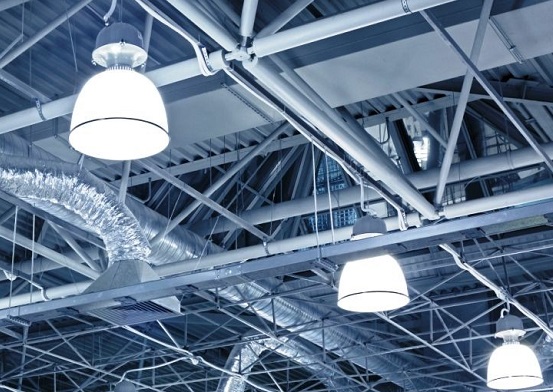Main author
Michael BrooksInterview with Julia Evans, BSRIA
BSRIA is one of the leading test, instruments, research and consultancy organisations in the UK, providing specialist services in construction and building services. The non-profit distributing, member-based association helps companies improve the design, construction and operation of buildings, with the aim being to 'make buildings better'.
Designing Buildings Wiki interviewed BSRIA's Chief Executive Julia Evans about the future trends posing challenges to the built environment, the likely impact of Brexit, the skills shortage, and more...
| Designing Buildings Wiki (DBW): BSRIA are looking at various future trends that pose challenges to today’s built environment. Do you think the industry is concerned enough, or responding well enough, to these at present? |
Julia Evans (JE):
The thing about construction and engineering is that some bits of it have stayed the same for millennia but other bits are changing at an incredibly fast speed. Construction is struggling to keep up with the digital age. Generation Z will have expectations about the links between the digital world and everything else – like being able to change the temperature of their house from their office.
The other issue, particularly given the parlous state of the housebuilding industry, is that we are still tied down by old skills, many of which are very valuable, but we need to get our head around off-site and the contribution this has made.
| DBW: If you had to advise building designers to focus on one of those future trends, which would it be? |
JE:
You can't choose just one, there would have to be a multiplicity. BSRIA are big in building services and what I say to my colleagues is that 'you have the keys to the kingdom' - architects can design the most beautiful or complex building, but without building services being introduced effectively it's not going to work.
It won't give Generation Z the kind of environment they expect - natural light, air conditioning which is not intrusive, clean air, and so on. And I expect the needs of the younger generations to drive the industry much more.
| DBW: Is there the concern that a short-term focus on building units, and trying to meet demand, will mean less attention is paid to longer-term issues about ensuring they try and tackle those future trends? |
JE:
What effect is Brexit going to have on this? What about pre-existing commitments and legislation up to 2050, or have we forgotten all about that already? The complexity of the landscape is such that you can't just take one issue alone.
Value engineering - the stuff you do to a proposal to bring down the price to the point where the customer says "yes, go for it" - is important. If you're a construction person, value engineering is wonderful, it's the thing that delivers for your business. If you're a building services person, it's an emanation of the worst things, because it usually means that what's value engineered out are the special things that would have made the building particularly energy efficient.
Building services sector is trying very hard to shed itself of the idea that building services are optional extras or 'green bling', because they're not. The flexibility of buildings needs to be constantly at the forefront of the architect, builder and any other subcontractors' minds - they need to be thinking about what else the building might look like or be used for in the future.
| DBW: What excites you most about the development of smart buildings and how are BSRIA engaging with this new trend? |
JE:
'Smart' is a very misused term. Buildings aren't clever, it's the people that design, build and fit them out who are clever. The systems themselves are not particularly clever. Smart really means digital connectivity.
BSRIA is really interested in digital because of the ability, not quite to take out the human element, but to make customisation possible – especially with wearable technology, where you get people with very different needs in the same environment – how do you alter that environment to make it more customised? Being able to be individual in an environment has not been achieved yet, but it's quite an aspiration.
| DBW: Is there the concern that new technologies are developing at such a rapid pace that the built environment will be unable to keep up? Considering there are still basic things, such as closing the performance gap, that the industry struggles with. |
JE:
Are building services keeping up? A lot depends on what the client specifies, but building services have a big role to play in terms of saying to clients, "if you want this outcome, you need to do this", and for the architect to take notice of that.
One of the things we do at BSRIA, in our environmental chambers, is build mock-ups for testing and we can see whether the air-conditioning, lighting, or whatever, works in practice. The only question is why doesn't everyone do that?
| DBW: Do you think the construction sector is well-poised to deal with Brexit? What concerns you the most? What would you like to see from the government moving forwards? |
JE:
Construction tends to sometimes ignore politics at its peril. In any case, Brexit will dramatically influence the economy. For construction, back at the beginning of 2016, BSRIA surveyed our members around the subject.
The things they came up with as key concerns are things that have subsequently emerged as general concerns - skills shortage, the inability of free movement, issues to do with regulatory context, and anxiety about access to research funds.
These are now developing with areas such as standard setting and possible trade tariffs.
| DBW: How can the industry effectively tackle the skills shortage? |
JE:
The drive to try and persuade young people who are interested in construction to come along and have a go, is unrelenting, and yet we still don't get the numbers we need. It's a huge conundrum and no one has really resolved it.
The new technical universities coming along will help,because it's acknowledgement that not everyone wants an academic education or wants to sit behind a desk for a career. There's got to be a limbering up around the subject, that everyone can succeed in construction, that there's a huge variety of jobs and careers there, but they are so hidden. We need to take responsibility for enthusing, inspiring and reaching out to the potential workforce.
I'm also a governor at Leeds College of Building, an FE college which specialises in construction and engineering, and they do amazing work. Leeds is a real centre for construction and engineering excellence, but it's the only specialist college of its kind. FE is a key part of this growth and drive towards excellence.
| DBW: In September 2017, we launched a report 'Fit for Purpose?' which examined the fragmented nature of construction knowledge. Do you think the industry lacks the leadership it needs to modernise and address the issues it faces? |
JE:
The lack of leadership does seem to appear as an issue in almost every report on the industry. But it is there, the demand is for collaboration. One of the main factors you raised was that under-35s tend to skim, rather than do deep research, there's a worrying change there.
The number of government ministers that have been responsible for construction is phenomenal. It has been said that the only time construction has really had a political profile was when it was seen to be a problem during the recession.
Now the economy has recovered somewhat, it's off the front pages again, except now we've got the Grenfell tragedy to consider. I think the inquiry, the review of Building Regulations, and any potential criminal cases, will all provide a huge suite of knowledge which we must all pay attention to. The industry must work together to ensure that such a tragedy never happens again.
| DBW: What more can be done to attract girls, and professional women, into the industry? Are you encouraged by the progress that being made to date? |
JE:
There hasn't been much progress to be honest. In general construction there's been more progress than in engineering, which hasn't progressed really in 100 years. It is a huge challenge, partly because of the traditional stereotype of it being dirty and unpleasant. Sometimes it will be, but that's all about being on a building site. There's lots of other things people can do. It's a real issue as women are half the workforce, and the solution for the skills shortage would be to get as many women interested in construction as men.
| DBW: People are becoming much more cognisant of the issues surrounding buildings and occupant wellbeing, how is this changing the testing that BSRIA are being asked to undertake? And do you think the issues are being taken seriously enough at top level? Would you, for instance, like to see government legislate to ensure certain wellbeing standards are achieved? |
JE:
Legislation is a rather blunt instrument – but sometimes needed to drive change for a preferable situation. We are a voluntarist nation; culturally, additional legislation should always be the last resort, though construction isn't that good at doing things voluntarily.
We probably do more testing on indoor air quality now than we have done. One of the things around this is the work done largely in Scandinavia on indoor air quality and its impact on children in schools - the better it is the better they learn, put simply. Testing air quality isn't a costly thing to do, but it is if you have to respond to results and improve air quality where needed.
[edit] Find out more
[edit] Related articles on Designing Buildings Wiki
Featured articles and news
Gregor Harvie argues that AI is state-sanctioned theft of IP.
Many resources for visitors aswell as new features for members.
Using technology to empower communities
The Community data platform; capturing the DNA of a place and fostering participation, for better design.
Heat pump and wind turbine sound calculations for PDRs
MCS publish updated sound calculation standards for permitted development installations.
Homes England creates largest housing-led site in the North
Successful, 34 hectare land acquisition with the residential allocation now completed.
Scottish apprenticeship training proposals
General support although better accountability and transparency is sought.
The history of building regulations
A story of belated action in response to crisis.
Moisture, fire safety and emerging trends in living walls
How wet is your wall?
Current policy explained and newly published consultation by the UK and Welsh Governments.
British architecture 1919–39. Book review.
Conservation of listed prefabs in Moseley.
Energy industry calls for urgent reform.
Heritage staff wellbeing at work survey.
A five minute introduction.
50th Golden anniversary ECA Edmundson apprentice award
Showcasing the very best electrotechnical and engineering services for half a century.
Welsh government consults on HRBs and reg changes
Seeking feedback on a new regulatory regime and a broad range of issues.
CIOB Client Guide (2nd edition) March 2025
Free download covering statutory dutyholder roles under the Building Safety Act and much more.






























